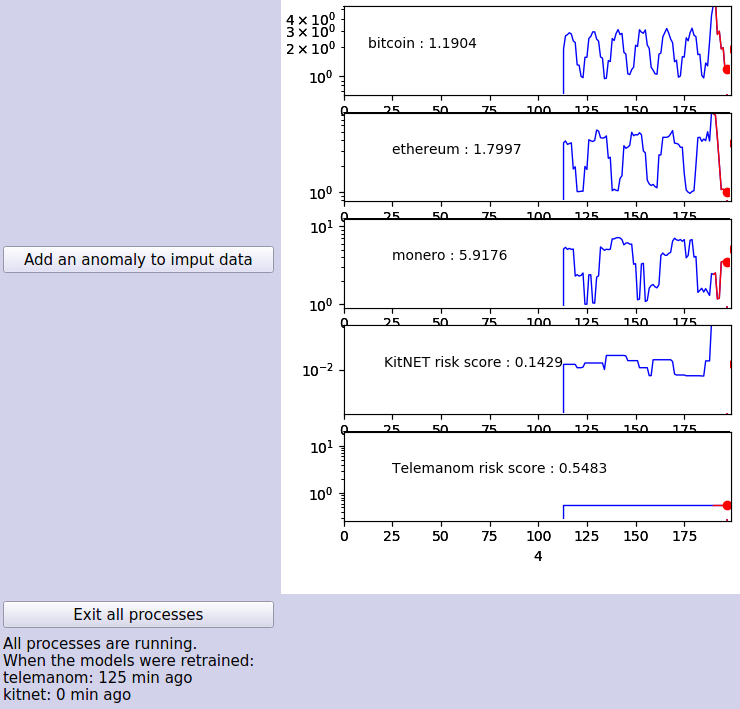Thio - a playground for real-time anomaly detection.
What if you could add an anomaly to your streaming data by clicking a button, and immediatelly see how an AI detects it?
With Thio, you can do it.
Thio takes synthetic or real-life data as the input (you can toggle between them in config/settings.xml).
The synthetic data is generated on the fly. If plotted, it looks like something one would get from noisy physical sensors (see the picture below).
The real-life data are current cryptocurrencies exchange rates, fetched from CoinGecko.
The data could have an arbitrary number of channels (defined in config/data_channels.xml)
Currently, Thio supports two anomaly detection algos - KitNET and Telemanom. Both are ANN-based, and both learn in an unsupervised manner.
KitNET is a lightweight online anomaly detection algorithm, which uses an ensemble of autoencoders. KitNET was developed by Mirsky et al, 2018, and released under MIT license. Please support them by citing their paper:
Mirsky, Doitshman, Elovici, Shabtai. "Kitsune: An Ensemble of Autoencoders for Online Network Intrusion Detection", Network and Distributed System Security Symposium 2018 (NDSS'18)
Telemanom is a framework for using LSTMs to detect anomalies in multivariate time series data. It was developed by Hundman et al, 2018, and released under an Apache 2.0 license. Please support them by citing their paper:
Hundman, Constantinou, Laporte, Colwell, Soderstrom. "Detecting Spacecraft Anomalies Using LSTMs and Nonparametric Dynamic Thresholding". KDD '18: Proceedings of the 24th ACM SIGKDD International Conference on Knowledge Discovery & Data Mining, July 2018, Pages 387–395
None of the mentioned people or organisations are affiliated with the Thio project.
You can run Thio on CPU, and it will still be able to detect anomalies in real-time, and learn on new data.
Training and inference processes are running in parallel. The models are regularly retrained on the latest N datapoints. The inference process uses the most recent model to produce risk scores.
Thio was tested on Ubuntu 16.04, with the following packages versions:
- conda==4.8.3
- Python==3.8.2 (in the thio_kitnet env)
- Python==3.7.7 (in the thio_telemanom env)
- numpy==1.18.1
- pandas==1.0.3
- pyyaml==5.3.1
- keras==2.3.1
- tensorflow==2.1.0
- theano==1.0.4
- cufflinks==0.17.3
- more_itertools==8.2.0
- scipy==1.4.1
- matplotlib==3.1.3
- requests==2.23.0
- psutil==5.7.0
Download this repo.
Create it:
conda create --name thio_telemanom
Type "y" and enter.
Activate it:
conda activate thio_telemanom
Install dependencies:
conda install numpy pandas pyyaml keras
conda install -c conda-forge tensorflow
pip install theano cufflinks more_itertools
Deactivate it:
conda deactivate
Create it:
conda create --name thio_kitnet
Type "y" and enter.
Activate it:
conda activate thio_kitnet
Install dependencies:
conda install scipy pandas matplotlib requests psutil
cd to the dir where 0launcher.py is located.
Launch 0launcher.py and wait a few sec.
A window (similar to the one depicted above) will be opened, with plots regularly updating.
Click the "add an anomaly" button and observe a bump in the two bottom graphs.
The anomaly was added to the input data, the data was processed by the anomaly-detection algo, and the corresponding risk scores were plotted.
If you want a KitNET model that can produce meaningful results, you need a dataset of at least 30 000 datapoints (a thumb rule). Same for Telemanom.
Telemanom will take some time after the launch before starting to detect anomalies. On my modest hardware (no GPU inference), it's about 15 min.
Thio is named after Isaac Asimov's Thiotimoline, a fictitious chemical that starts dissolving before it makes contact with water:)
If you have any questions that can't be resolved through Github, feel free to contact me directly.
